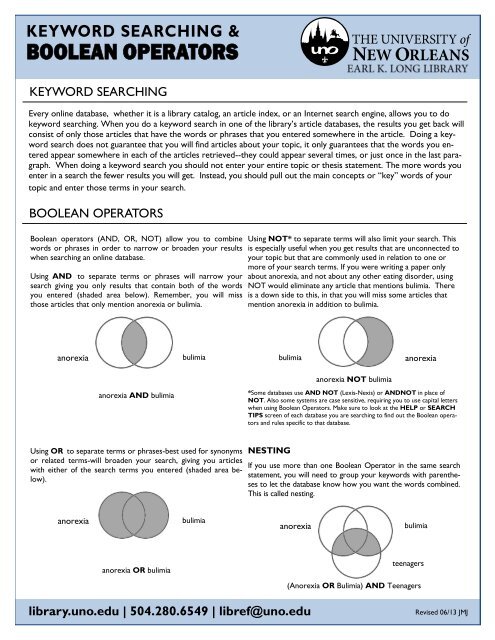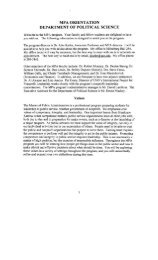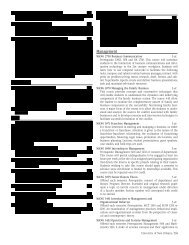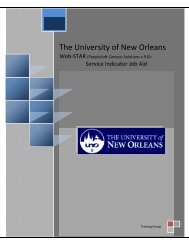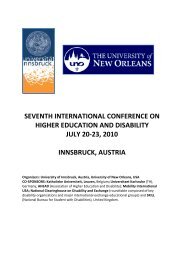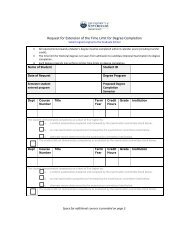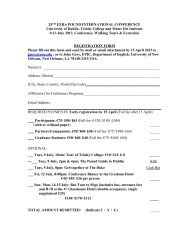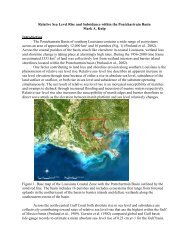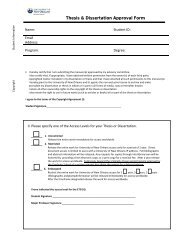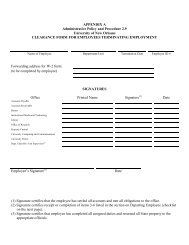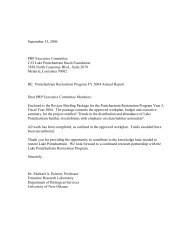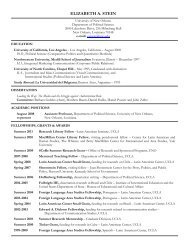Keyword Searching & Boolean Operators
Keyword Searching & Boolean Operators
Keyword Searching & Boolean Operators
You also want an ePaper? Increase the reach of your titles
YUMPU automatically turns print PDFs into web optimized ePapers that Google loves.
KEYWORD SEARCHING &<br />
BOOLEAN OPERATORS<br />
KEYWORD SEARCHING<br />
Every online database, whether it is a library catalog, an article index, or an Internet search engine, allows you to do<br />
keyword searching. When you do a keyword search in one of the library’s article databases, the results you get back will<br />
consist of only those articles that have the words or phrases that you entered somewhere in the article. Doing a keyword<br />
search does not guarantee that you will find articles about your topic, it only guarantees that the words you entered<br />
appear somewhere in each of the articles retrieved--they could appear several times, or just once in the last paragraph.<br />
When doing a keyword search you should not enter your entire topic or thesis statement. The more words you<br />
enter in a search the fewer results you will get. Instead, you should pull out the main concepts or “key” words of your<br />
topic and enter those terms in your search.<br />
BOOLEAN OPERATORS<br />
<strong>Boolean</strong> operators (AND, OR, NOT) allow you to combine<br />
words or phrases in order to narrow or broaden your results<br />
when searching an online database.<br />
Using AND to separate terms or phrases will narrow your<br />
search giving you only results that contain both of the words<br />
you entered (shaded area below). Remember, you will miss<br />
those articles that only mention anorexia or bulimia.<br />
Using NOT* to separate terms will also limit your search. This<br />
is especially useful when you get results that are unconnected to<br />
your topic but that are commonly used in relation to one or<br />
more of your search terms. If you were writing a paper only<br />
about anorexia, and not about any other eating disorder, using<br />
NOT would eliminate any article that mentions bulimia. There<br />
is a down side to this, in that you will miss some articles that<br />
mention anorexia in addition to bulimia.<br />
anorexia<br />
bulimia<br />
bulimia<br />
anorexia<br />
anorexia NOT bulimia<br />
anorexia AND bulimia<br />
*Some databases use AND NOT (Lexis-Nexis) or ANDNOT in place of<br />
NOT. Also some systems are case sensitive, requiring you to use capital letters<br />
when using <strong>Boolean</strong> <strong>Operators</strong>. Make sure to look at the HELP or SEARCH<br />
TIPS screen of each database you are searching to find out the <strong>Boolean</strong> operators<br />
and rules specific to that database.<br />
Using OR to separate terms or phrases-best used for synonyms<br />
or related terms-will broaden your search, giving you articles<br />
with either of the search terms you entered (shaded area below).<br />
NESTING<br />
If you use more than one <strong>Boolean</strong> Operator in the same search<br />
statement, you will need to group your keywords with parentheses<br />
to let the database know how you want the words combined.<br />
This is called nesting.<br />
anorexia<br />
bulimia<br />
anorexia<br />
bulimia<br />
anorexia OR bulimia<br />
teenagers<br />
(Anorexia OR Bulimia) AND Teenagers<br />
library.uno.edu | 504.280.6549 | libref@uno.edu<br />
Revised 06/13 JMJ


